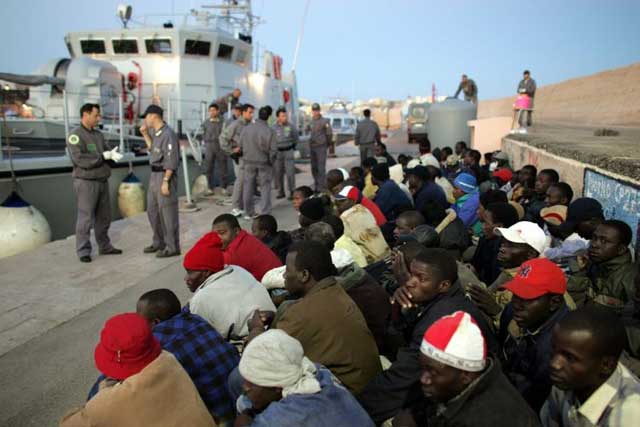Hundreds of immigrants land on Italian island

More than 900 immigrants have arrived on the southern Italian island of Lampedusa this weekend, bringing the numbers which have landed in Italy this year to more than 30,000 - more than double the number that arrived in 2007 and much the highest figure since the traffic started.
The conditions of the journey, which takes at least four or five days, are more hellish than ever. “They travel literally one on top of another,” said Francesco Galipo, at the Maritime Rescue Centre in Palermo. “We have intercepted boats 14 metres long with 324 people on board.”
After a lull during which rough seas prevented crossings, the latest landings brought the arrivals over the Christmas period to more than 1,700. Laura Boldrini, spokesperson for the United Nations High Commission for Refugees, commented, “We can no longer consider summer the only season when people arrive. Now they are coming all the year round.”
Lampedusa’s reception centre was designed for 840 but now accommodates more than twice that number, and it is approaching breaking point.
The overwhelming number of migrants leave from Zuwahara, a seaside town west of Tripoli that is enjoying a boom time on the back of revenue from the people traffickers, said to be at least €2 million per month.
On Saturday, there were signs of internal squabbling within the government as Interior Minister Roberto Maroni of the right-wing rabble-rousing Northern League urged Foreign Minister Franco Frattini to persuade Muammar Gadaffi to live up to his promises and allow Italy to control the numbers leaving Libyan shores.
In August, Prime Minister Silvio Berlusconi signed a historic agreement with Colonel Gadaffi, intended to cement the reconciliation of Libya with its former colonial master. Italy would pay Libya 5 billion dollars in reparations over 25 years, and Libya would allow Italy to patrol the coast. Italy’s parliament has yet to ratify the reparations deal, however, and without that the Libyans won’t sign off on foreign patrols. And now the floodgates of Zuwahara are open again.
Many of the arrivals in Lampedusa in the past week come from Maghreb countries with which Italy has re-admission agreements, meaning that once their nationality has been confirmed they can be sent back, often within a week or two of arriving. But the UN’s Laura Boldrini stressed that many also come from the war zones of Eritrea and Somalia.
“The percentage of asylum-seekers among the new arrivals is getting higher and higher,” she said. “Italy received 25,000 new asylum-seekers in 2008, and many of those came from across the Mediterranean.” She said she did not know if the agreement between Gadaffi and Berlusconi contained special provisions for migrants escaping from war zones because the UNHCR has not been privy to the document. “Libya has no asylum system to guarantee the protection of people in need,” she pointed out, “and has not signed the Geneva accords on asylum.”
Corriere della Sera reported that the reception centre in Lampedusa was at bursting point even before the arrival of the latest boat-load. With all 840 beds occupied, mattresses cover the floors, the infirmary has been converted into a dormitory for 100 people while another 50 are crammed into the converted container intended for families. Tents put up in November remain in place, hosting another 120. “The centre has been swamped by migrants for months,” said Federico Miragliotta, the centre’s director. “But it’s not true that this is a hell, nor that sanitary conditions are a scandal.”
In August Berlusconi’s coalition allies, the xenophobic Northern League, hailed his agreement with Gadaffi as a triumph that would bring illegal immigration to an end. “This agreement sterilizes the situation with the country that sends us all the immigrants,” claimed the League’s leader, Umberto Bossi. Yet despite his large majority and his vow to solve Italy’s problems, Berlusconi has so far enjoyed no more success than his predecessor Romano Prodi in bending Gadaffi to his will.
Join our commenting forum
Join thought-provoking conversations, follow other Independent readers and see their replies
Comments